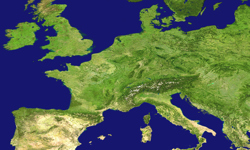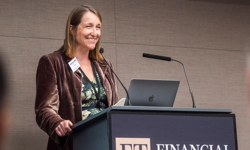Ghosts, big cats and a giant crab are perhaps unlikely bellwethers of the media industry, but in Kent, they are indicative of the way in which people consume news through different publishing platforms.
The Ghost of Bluebell Hill is among KM Media Group’s most-read recent stories online, along with a reported sighting of a black panther in West Malling, and a picture purported to be Crabzilla, a giant crab off the coast of Whitstable.
“Stories that do well online are quirky stories and big breaking news, as opposed to the more community-focused content that sits well in print but never gets read online,” says Geraldine Allinson, chairman of the media group that has been in her family for generations.
The group’s heritage is in newspapers, but it is now active online, in local radio and has recently made its television debut in partnership with the University of Kent, with KMTV.
Allinson says the business is changing week to week, and while new media are increasingly important, print remains at the heart of the company. In the past few years, KM Group has even launched several new printed products, most recently, the Folkestone & Hythe Express, which hit newsstands in 2013.
“There seem to be a lot of companies that are shifting everything to the web at the moment, that’s absolutely the most important thing for them,” she says. “We’re trying to take a more balanced approach; we still think our printed products are vitally important. Over 80,000 people a week walk into a shop and buy one of our paid-for local weekly papers, and the audience for all our printed products is over 440,000 a week.”
The way consumers move between the products – new online readers often are drawn to the site through social media links, for instance – means the business has to increasingly work across what have traditionally been boundaries. Video content created primarily for KMTV is often embedded in content online, and in sales, there’s a breadth of understanding about the way the different offerings work together.
New thinking needed
The adjustment from print to multi-media has taken some getting used to, Allinson says. No only do stories need to be gathered in new ways and advertising sold differently, but there is an entirely different regulatory environment to consider, and one that has not necessarily kept pace with change in the media industry. The Competition and Markets Authority, she says, needs to look at the sector in an entirely new way.
“When they look at our marketplace, they seem to define our industry as printed tabloid local newspapers, when in fact, we compete with Google, we compete with Facebook, with local radio, with magazines. At the end of the day, someone who’s got a pound to spend on marketing activity has so many choices of where they can spend that pound … they’ve got to see our industry in the new world.”
Radio and online revenue has been rising significantly in recent years. Radio now accounts for 15 per cent, online for 12%, and the remainder comes from print. The business is not yet selling advertising on KMTV, but is in talks with advertisers about how they might be able to use it. The company also provides a creative service for advertisers who are not necessarily spending their media budget with KM. The website has nearly two million monthly unique views; the population of Kent is only 1.7 million.
As the range of media offerings is broadened, Allinson says she is not too concerned about cannibalising ad spend from elsewhere in the group. In fact, diversity helps keep advertisers within the group, she says. “There’s only a finite amount of spend, but on all our platforms, we have local advertisers and national advertisers. By offering the different media, you’ve got, A, the chance of giving them better penetration and, B, keeping the revenue. If they’re going to spend it online, they’ll spend it online.”
Light and shade
The giant crab stories and other quirky features that make readers smile are part of creating the right balance of coverage to which Allinson credits much of KM Group’s longevity. The community trusts their journalists, and editorial works hard to strike the right note.
“Every day, they’re dealing with nasty stories about nasty things that happen within the local community they serve, but they know very well that people have to love where they live, and so they have to get a good balance of stories throughout our printed product so they engage people,” she says.
“Readers do have a right to know about the horrible things that happen because they need to know … but there are always stories about people raising money or doing good things in the community. That is very, very important. There are other newspapers where that relationship doesn’t exist and I think it’s terribly sad when you see a local newspaper rubbishing the area that they serve.”
Deep roots
Allinson is the fourth generation of the family behind KM Group. Her great-great grandfather, Barham Pratt Boorman, took over the Maidstone Telegraph – now the Kent Messenger – in 1890. He was succeeded by his son, Henry Pratt Boorman, in the late 1920s, who advocated the extensive use of photography in newspapers to draw readers in. Henry’s son Edwin took over in 1959, and was succeeded by Geraldine Allinson, his eldest daughter, in 2006.
But Allinson had never intended to join the family business. Having finished her A-levels, she signed up to do a computing course before the summer break and university, to study geography or geology. But when industrial unrest rocked the British newspaper industry and the number of walk-outs meant all family hands were needed on deck, she found herself doing paste-up, a job that no longer exists but which was then a crucial stage of production. She did it for a week, and came back for casual work over the summer break. She got hooked.
“Actually I loved being in the business, it was a real family atmosphere. The people working inside the building were like a family, they were trying to keep the company going,” she recalls. Allinson switched her degree to business studies, and has worked in newspapers ever since. She worked at the Express & Star (Wolverhampton) during her studies, majoring in marketing, and went on to work at newspapers in Wales, Barnstaple and Cheltenham. Her return to Kent came about when she got engaged; her father, thinking she might settle permanently in the West Country, where she was working, asked her to join the family business. Her first day was in November 1993.
Celebrating 300 years
The oldest title in the group is the Kentish Gazette, which serves the Canterbury area. It will celebrate its 300th anniversary in 2017. While in the early years of the business, the focus was on launching and acquiring new print titles, the push more recently has been on adapting. Evening papers were changed to weeklies a few years ago, to better fit with modern life and the way people consume news.
“The business has changed massively,” she says of the past twenty-plus years. “I don’t think there’s anyone in this company that’s doing the same thing. They might have the same job title but they’re doing their job in a completely different way than they were doing it even five years ago. When you look at a paper from even just fifteen years ago it looks very old-fashioned.”
What hasn’t changed at all, Allinson says, is the company’s commitment to local communities. “We’re committed to serving the people of Kent and we’re absolutely passionate about that.
“Our strapline is ‘Together, we make a difference’ and yes, that works from an advertising point of view because we sell advertising across our platforms, so if a client wants to get to the population of Ashford, for example, the best way for them to do it is, yes, advertise in the papers but also on the radio station and the Ashford part of our website, then they get a much deeper penetration of the market than if they did any one. It’s also very much our editorial strapline. We honestly believe that if anyone or any community wants to get something done in their area, if they involve us, we can help them to make it happen quicker. We exist to help make Kent a better place to live and work. It’s collaboration.”
As the group has moved beyond print, it has tried to take with it that sense of trust among readers that has been established over many years. What the business has never sought to do, however, is replicate its winning formula beyond the boundaries of Kent. Allinson says there’s no particular reason why not. “But we are passionate about Kent and we’re family owned, so to do a big expansion, potentially it would put that in jeopardy.”
Whether Allinson will be succeeded by a new generation of leaders from within the family is yet to be seen. Her brother is eighteen years her junior and is a non-executive director on the board, as is a cousin, who, like Allinson, has teenage children. “It would be lovely if they are interested but, equally, it’s their life, and to work in a family business is a huge commitment and they would have to really want to do it. I would encourage them to go off and do their own thing and if they’re interested, who knows what might happen. I’m not going to persuade them to do it.”
Whoever is at the helm decades from now, what’s clear is that they will be running a business that continues to evolve with its readers. “We think the company will be full of talented people who do not work in silos. Really, commercial and editorial, because they’re customer facing, will be the ones that will remain quite like they are now, although the way they do things will change, but all the other parts of the business will be integrating more and more, they’ll be more fluid,” Allinson says.
“People who have one job title and do the same thing, day in, day out – I think those days are gone. But the company will be serving the people of Kent in the best way we possibly can, with high-quality journalism with products and services that people trust.”
Chairman: Geraldine Allinson
Newest launch: KMTV, a TV station for the Kent area, in 2015
Best-known brands: Kentish Gazette, Medway Messenger, Folkestone Express, Dartford Messenger, Sheerness Times Guardian, Sittingbourne Messenger.
Turnover: £18.5m (2014/2015)
Employees: 278 full time equivalent












